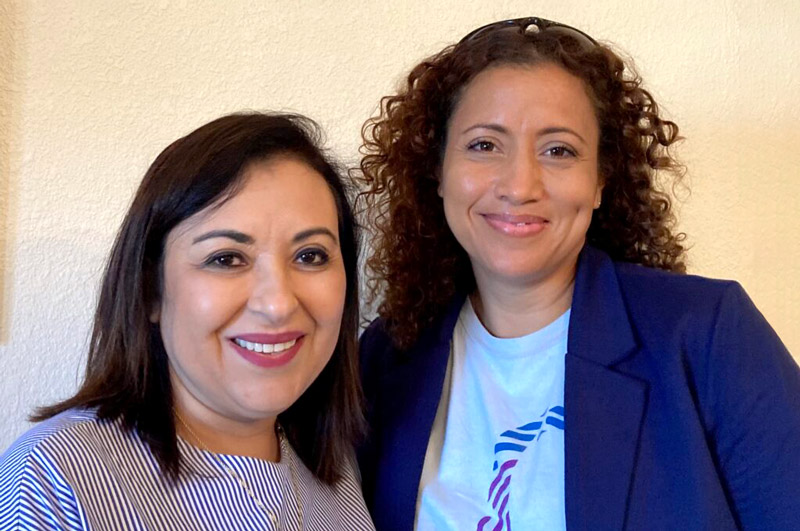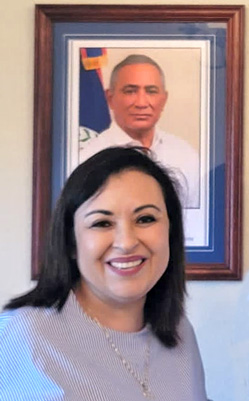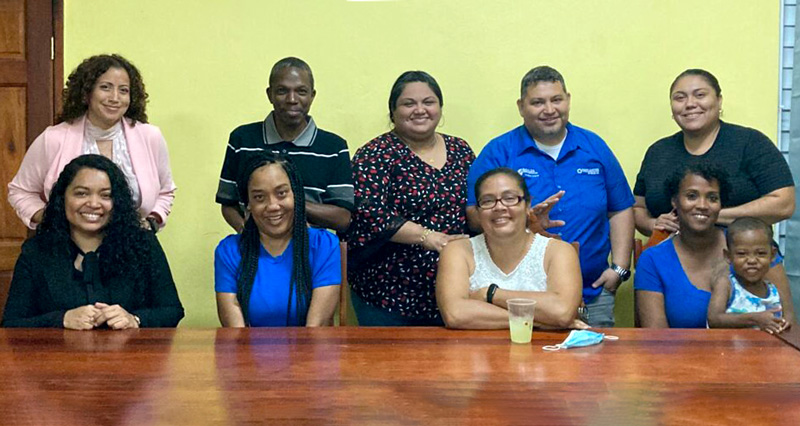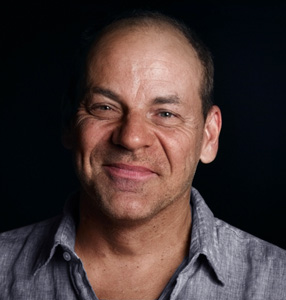She doesn’t flinch…
“We need money! We need a lot of money. We need a lot of training, and it costs a lot of money…We’re not lost. We’re not this little country that has our heads in the sand. Every time somebody suggests to me ‘Let’s have a Special Education summit!’ It upsets me…because I feel they want to rehash and rehash, same/old and same/old, and talk, talk, talk, talk,…We know what our issues are, we know how to fix them.”

Her Excellency, Mrs. Rosanna Briceño, First Lady of Belize, with Christy Castillo Almeida, the Founder of Autism Belize
Armed with a degree in Special Education from the University of Chicago, Her Excellency, Mrs. Rosanna Briceño, is no typical “First Lady.” Her passion for autism and other disabilities contains no optics; and her frustrations…no filter. Though the picture of approachability, she is constantly lurching her frame forward from the sofa, thrusting her arms to drive home her points.
Her Excellency was first exposed to Special Education at age 18 and quickly realized it was her mission. Laughing, she states, “That was thirty-five years ago, and I have since been called an ‘old soldier’ many times.”
I have been given an unprecedented hour with her and her “partner-in-crime” (both in and outside the Belizian school system), Christy Castillo Almeida, the Founder of Autism Belize.
***
One of my many “hats” in the autism world tasks me to both inform, and gain exposure for the work of fledgling, but workaholic, autism organizations in Central and South America. Because of their economic challenges they often look to us for leadership, as too often amongst the overwhelmed there is an obligation to emulate the autism developments that have occurred in the US. But when they are so overwhelmed, it is hard for them to see that based on our relatively privileged economy, we are actually no great example. We in the U.S. are still engulfed in unlearning so many mistakes. So if challenged economies starting at baseline can somehow avoid the comic/tragic pitfalls of vaccine theories, punitive ABA, and the messaging of organizations like Autism Speaks, they could theoretically surpass us.

H.E. Rosanna Briceño in front of a photo of
her husband, Prime Minister John Briceño
Here in Belize this latter role is unnecessary. Powerhouses Almeida and Mrs. Briceño need no such education. They are more than advanced enough in their comprehension of all that has occurred. They have done the feasibility work. They know what they need, and their need is great. Belize has only 1 SLP (Speech and Language Pathologist) working full time in the entire country. They have no full-time OTs, BCBAs, FloorTime Therapists, or Play Therapists. Their insurance companies won’t insure for autism – not even for basic health or the cost of an official diagnosis. In this land of around 420,000 Creole, Mestizo, East Asian, and Maya, there is only one special needs school (containing 11 classrooms) and only 20 special education classrooms in 14 regular education locations throughout the country. In these classrooms they have a total of 54 teachers working with more moderate to significantly challenged. Most of these teachers got one class in Special education during their schooling.
But Briceño has stuck with a strategic plan. And training teachers is a huge part of it.
“We need to get teachers that are not only passionate, but have the right attitude. We need to work on attitudes. Changing their attitudes.” If it’s just a job?…We need culture change!”
Almeida cuts in:
“10 years ago we were in denial. We did 24 teacher trainings last year, which is good, but then you sometimes go into their classroom, and you go, ‘Where’s the visual schedule?’”
Briceño returns:
“(The teachers) know a lot more than they think they do, and that’s why a lot of it also has to do with the implementation…At some point we have to get them to be open to new ideas…(Even) the principals now are open. They’re not saying ‘no’ anymore. But they need a lot of support and training.”
For a short while, the interview then turns into a conversation between Briceño and I. We trade “That is not ‘inclusion’” stories from our consulting backgrounds. Briceño shares with me how they’re creatively enticing trainers from abroad in exchange for free vacations…
And on autism?
“It’s not a taboo subject anymore…Parents are demanding the appropriate education for their children. Once they understand that it’s not the end of the world. That this is a behavior…We’re understanding more of why the children behave this way.”
She has inexplicably gone over her frustrations far more than expected. So, I ask what she is proud of. The answer? Her, her team, and the work of the Ministry of Education. “Over the last 3 years we have out surpassed all the work of the past.”
***
The focus then turns to Christy Almeida, whom I know somewhat prior from several emails and a training I once gave her organization, albeit through Zoom. She’s astonishing: A single mom with a 15-year-old, adult-sized, non-speaking son. She is still rebuilding the home that was flooded a few months ago by the last major storm. Given all that, Almeida should be infinitely more fatigued than she is and appears. She too, like Briceño, drives her points home, but unlike the First Lady’s affability, Almeida has a righteous aggression to her passion that is distinctly hers. In my meetings with her, the toughness, the engine, and the intelligent spark dominates. No surprise that when it comes to a “go to” on autism, she’s the one on Belizian TV or radio for a reason.
(Don’t get me wrong: Now a friend, I can attest that) Almeida is fun, but she does not need mutual laughter to enrich or reassure a conversation when it is about serious subjects.
Briceño: “Christy does most of the work. She’s passionate! Christy has put her life story on the table!”
Her Excellency stated that when they first met and Almeida told Mrs. Briceño about her plans for Autism Belize, that the First Lady thought to herself “yeah, yeah, yeah. I’ve heard that before. Let’s see if you (Almeida) can do the follow-up. “She can, and she did.”
Almeida chimes in: “A lot of people say they want to help you, but you don’t know what you don’t know…You know when I go into the Belize airport, they don’t have a family bathroom, they only have the handicap bathroom. I have to take my six-foot-one son in the female bathroom then into the handicap stall. And this has happened more than once that by the time I get out, someone’s reported that…‘there’s a guy in the (female) bathroom. ’” Almeida says it always gets worked out, but that, “you can tell that (my situation) has never dawned on them.”
***

Back row left to right: Christy (Almeida), Kirk, Dulce, Alex, Azalia
Front row left to right: Stephanie, Kareesh, Elsie Mae, Roslyn, and a young man who OD’d on cute pills
With less than 48 hours’ notice, eight parents from Autism Belize have come to an impromptu sharing session with me at 6 pm on the Wednesday I am there. In relative terms, such numbers are wonderful for a startup such as this. And, as per usual, the attendees are mostly moms.
One could write so much about the value in the relationships these parents have with one another as individuals. But what is so starkly evident is that the real value to them as individuals lies in the collective. And as and in that collective they are good, and also fun. They appreciate the guest (me) and pepper me with questions, but the answers they receive pale in comparison to the reassurance they feel to be with one another. Most know enough about autism to know that the youngsters who might appear like me (or my older son) are far from being diagnosed still in Belize (one or two who came alone gleefully refer to their husbands back at the house as “probably”). They are aware of what is to come.
And they do not let their more-challenged and non-speaking kids make them vulnerable to unhealthy attitudes. They share the stories of celebrated difference as well the challenges. Karate vs. dancing is discussed for one child who is being bullied. A non-speaking 12-year-old girl encountering puberty is surprisingly much more bothered by the new bra than by the menstrual changes to her body. Both dads in attendance don’t know how to not overwork…
As always the world over, these autism parents too, need to enjoy life outside their children, and often they will need the help of each other to make that happen. And of course they resist, falling into the (monstrously inaccurate) martyrdom stereotypes of parenting that we are led to believe is noble. Their children, “after all,” cannot be understood or properly cared for by strangers. But even their most challenged children can be understood, if not by the world someday, at least by each other.
I asked one poor dad, Alex, how he can make room for more pleasure in his life. He answers why that’s not possible, and I call him on the fact that he is dodging my question by focusing on what he can’t do, as opposed to what he can do, and everyone laughs knowingly; not because it’s any brilliant insight, but because they all recognize that they would answer similarly. They need more meetings like this.
Almeida made sure there was a feast of sandwiches and chicken fingers for the attendees, and lemonade filled with minced apple pieces to wash it down. But it is almost entirely left untouched. Clearly, their nourishment is each other.
***
Attitude change costs nothing. But that does not invalidate the need for money that Briceño emphasizes, Training is the sharing of the otherwise hidden healthy attitudes, and strategies. They’re on a roll.
But Belize too, like us, has a two-party system, both of whom have different views on life. Should her husband’s party not win the next election, who knows what will happen to all this progress….

Michael John Carley
This article was originally published on the Neurodiversity Press Blog and has been republished with permission.
Michael John Carley is the Facilitator of the “Connections” program at New York University for their worldwide autistic students, and he also has a private, Peer Mentoring practice. In the past, he was the Founder of GRASP, a school consultant, and the author of “Asperger’s From the Inside-Out” (Penguin/Perigee 2008), “Unemployed on the Autism Spectrum,” (Jessica Kingsley Publishers 2016), “The Book of Happy, Positive, and Confident Sex for Adults on the Autism Spectrum…and Beyond!,” (Neurodiversity Press 2021, where he recently became the Editor-in-Chief), and dozens of published articles. For more information on Michael John, or to subscribe to his free newsletter, you can go to www.michaeljohncarley.com.



